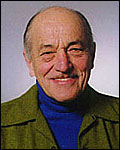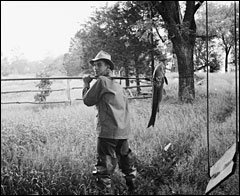
What work do you do?
Mostly the organizations I’m involved with are oriented toward active programs for nurturing quality pieces of nature. I am on the board of the Aldo Leopold Foundation; president of the Tropical Forestry Initiative; founding president of the Finger Lakes Land Trust; on the board of the Black Locust Initiative; vice president of the Greensprings Natural Cemetery; and president of Commemorative Nature Preserves.
I am the emeritus W.H. Crocker Scientist at the Boyce Thompson Institute at Cornell University. I retired in 1990, but I continue to do a modest amount of research, and I continue to write about and remain active in environmental issues, an interest that came naturally through my family.
How does it relate to the environment?
The Aldo Leopold Foundation has the mission to promote the land ethic through the legacy of Aldo Leopold. My family started the foundation in 1982 in response to growing interest in our father’s life and work, including A Sand County Almanac. Over the past few years, the foundation has designed and built the Aldo Leopold Legacy Center, an energy-efficient building that opened in April.
The Tropical Forestry Initiative is doing experimental work on how to restore tropical rainforest in Costa Rica. The Finger Lakes Land Trust works in New York state’s Finger Lakes Region to protect land through purchase or holding conservation easement. The Black Locust Initiative promotes use of black locust wood, a naturally rot-resistant wood, instead of chemically treated wood, and does outreach to grade-school kids. Greensprings Natural Cemetery is providing sites for natural burials: burial plots in a natural, very peaceful country setting without chemical preservatives or cremation. Commemorative Nature Preserves is bringing natural-history education to existing nature preserves and also is a means of memorializing deceased citizens.
What are you working on at the moment?
As well as all of the above, I’m writing a piece about tropical forests.
How do you get to work?
I drive a scooter for all local transportation. I get 100 miles per gallon of gasoline. In winter, I drive my 1992 Subaru Justy. It has optional four-wheel drive and gets 35 miles per gallon.
What long and winding road led you to your current position?
I grew up with family that was very close to nature and who did exciting restoration of otherwise ruined Wisconsin land.
Where were you born? Where do you live now?
I was born in Albuquerque, N.M., while my father was employed with the U.S. Forest Service. Then we moved to Madison, Wis., where I went through the school and university system. After four years in the Marine Corps, I went to Harvard for graduate work, then to Purdue University for 25 years, then to University of Nebraska administration, then to Cornell for research. I’ve been in Ithaca, N.Y., for 29 years.
What environmental offense has infuriated you the most?
The alleged election of George Bush in 2000, and the failure of our government to protect our Constitution against the long sequence of violations ever since.
Who is your environmental hero?
Aldo Leopold, of course.
How do you spend your free time (if you have any)? Read any good books lately?
I’m currently reading the new book by John Kerry and Teresa Heinz Kerry. My other hobbies are ceramics and music.
Which stereotype about environmentalists most fits you?

Carl on the family’s Wisconsin property as a boy.
Courtesy Leopold family.
I believe in the environmentalism that is generated by real work out in the real ground. Working with the environment generates good environmentalism. It is mighty difficult to really love something that you know about only through words.
What’s your favorite place or ecosystem?
Costa Rican tropical forests. And, of course, the family shack in Wisconsin.
If you could institute by fiat one environmental reform, what would it be?
Educate the public about effective family planning. This can be done effectively only by linking it with improving the status of people in poverty.
Who was your favorite musical artist when you were 18? How about now?
Then, Fritz Kreisler. Now, Hector Villa-Lobos and Astor Piazzolla for tangos.
What’s your favorite TV show?
I have no TV.
If you could have every InterActivist reader do one thing, what would it be?
Read A Sand County Almanac.


